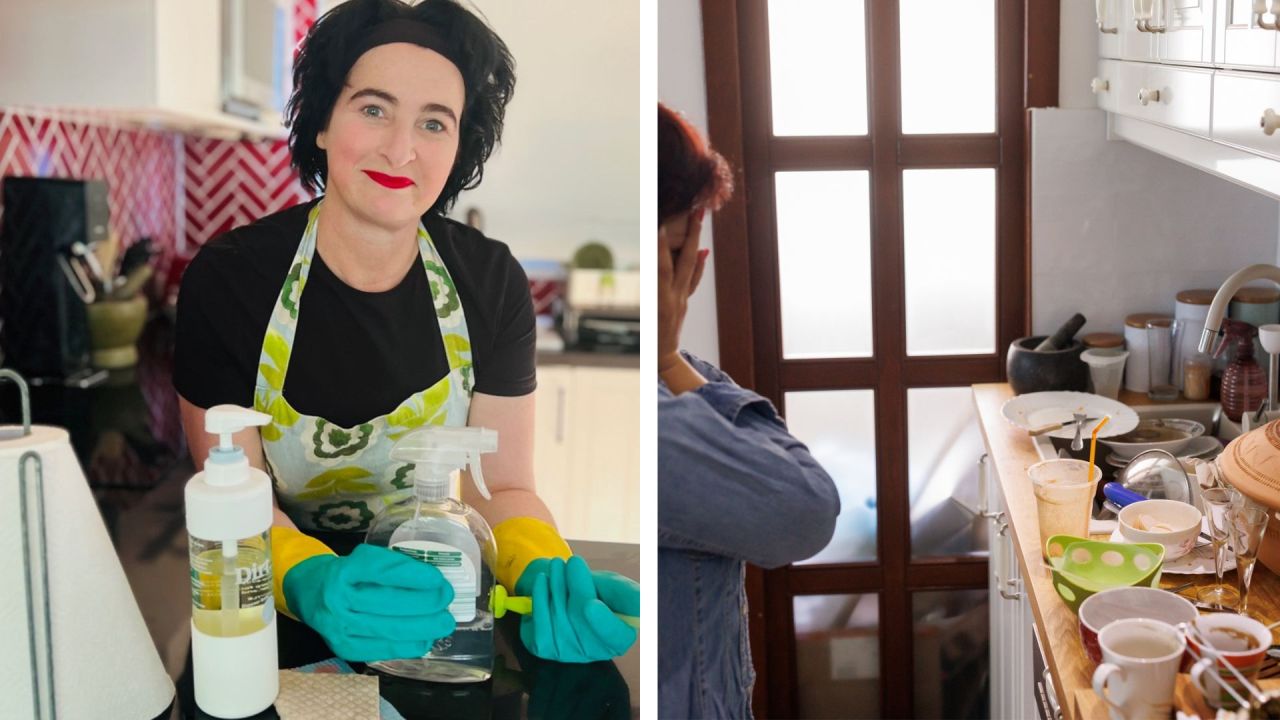Two of my friends have filthy homes - they say it's because of their ADHD
“I was raised to think tidiness was highly valued. I was constantly criticized for not meeting the standard; I felt a lot of shame.”
Parenting
Don't miss out on the headlines from Parenting. Followed categories will be added to My News.
Two of my besties – both middle-aged mums like me, who are also neurodiverse – have houses that are absolute bombshells.
If you walk in the door, stuff is piled up everywhere.
The corridor is a tripping hazard. Couches might be covered with clean laundry and dog hair (Is there any point in washing the clothes if they’re just going to get covered in fur again?).
The living room floor is a carpet of LEGO pieces that never get put away, along with leftover sandwich crusts from kids. The kitchen bench is covered in dirty dishes.
I can almost hear you saying, “Ewww!” and see you wrinkling your nose. But hold on.
Here’s the thing: My friends – let’s call them Brooke and Sally* – aren’t alone.
Want to join the family? Sign up to our Kidspot newsletter for more stories like this.
RELATED: ‘My autistic teenage daughter tracks my location all day’
"The mess in our house is chronic and overwhelming"
More than a million Aussies have ADHD - including myself - and many struggle with cleaning.
It’s not because they’re lazy or dirty. ADHD has some positives, like creative thinking and hyperfocus (in certain situations), but it also comes with challenges.
Individuals with ADHD may struggle with impaired executive functioning, time management, focus, working memory, and starting tasks. And that, my friends, can make cleaning a nightmare.
Brooke tells me: “We don’t have a dining table or coffee table… any surface is fair game to be covered with stuff. It’s a decision we’ve made for our own good.”
“The mess in our house is chronic and overwhelming,” she says.
“We have too much stuff and nowhere to put it. We also have no energy to do anything about it. This has been going on for over a decade.”
Brooke’s shame stops her from inviting people over: “The thought of having someone in the house and seeing the bedrooms is massively stress-inducing.”
Sally faces this too.
“The mess affects my social life because I’m much happier doing things at other people's houses than having people over to mine,” she says.
Like Brooke, she feels the weight of societal expectations: “I was raised in a household where tidiness was highly valued. I was constantly criticized for not meeting the standard, and I felt a lot of shame.”
Sally clearly remembers an incident where her son’s friend, a six-year-old, entered her house and exclaimed: “God, look at this place. Why is it so messy?” She was taken aback.
To make matters worse, societal judgment on women with messy houses is harsher than it is for men.
For women, it’s often seen as a moral failing.

RELATED: ‘Mum, why aren’t I ever invited to anything?’
Social media has a lot to do with house judgement
Sally believes the rise of social media, and folks displaying supposedly immaculate homes, exacerbates this. “It sends the untrue message that messy houses mean you’re not good at motherhood,” she says.
Brooke’s 11-year-old daughter is diagnosed with inattentive ADHD. Brooke herself has depression and anxiety, and her husband and teenage son face other challenges.
“I have no idea how to manage this problem or how to teach my daughter to manage it,” Brooke says.
She explains that cleaning makes her daughter melt down: “Even though she can’t use anything in her room because it’s buried under piles of stuff, the suggestion of cleaning sends her into screaming fits.”
Along similar lines, an anonymous mum posted in an online support group: “I’m at my end with the mess... I don’t know what to do anymore. She’s 16. We’ve tried everything.”

The ADHD/clean home struggle is real
So, what can we do?
First, let’s decide to judge less.
Especially when it comes to our friends with messy houses – particularly if they are parenting neurodiverse children.
The struggle is real.
Sally has found that understanding the benefits of decluttering has helped: “It’s an important life skill for practical and mental health reasons,” she says.
These days, Sally involves her three teenage children in household chores. It helps teach responsibility and reduce chaos.
She’s also learned about the ADHD tendency to create “doom piles” – random items meant to be organised later but left untouched, creating feelings of overwhelmness. This realization led her to break cleaning into smaller tasks.
“Now that I see a doom pile forming, I’ll tackle just three items,” Sally explains. “This gives me a feeling of achievement and a little dopamine hit.”
She applies this approach to other tasks too. “I haven’t cleaned the whole kitchen, but I did clean out the fridge.”
What else can help with cleaning when you have ADHD?
- Break big tasks into smaller parts (as Sally says)
- Use technology! AI tools like ChatGPT can help break tasks into manageable steps. Apps like Trello, TickTick, and Microsoft To Do are also great assistants.
- Try “body doubling” – this is where you work on a task in the presence of another person. It often enhances focus and motivation and really helps folks with executive function issues.
- Be patient and compassionate with your ADHD child and with yourself
*Because of the societal stigma attached to having messy homes, I’ve elected not to name my two friends.
Ginger Gorman is a social justice journalist and author. She also has ADHD. Her upcoming book for Harper Collins is called, “Flying not Falling.”
More Coverage
Originally published as Two of my friends have filthy homes - they say it's because of their ADHD








